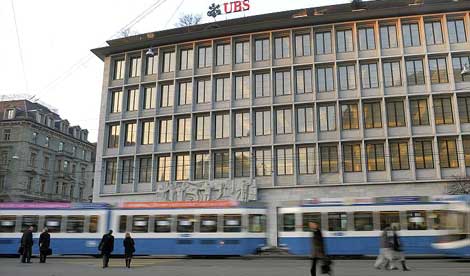
US Determined to Unlock Switzerland's Banking Secrets
Prosecutors have accused UBS, the country's biggest bank, of cloak-and-dagger activities
It is a world of encrypted laptops, unmarked mail and the briefest stops in multiple hotels. Accusations by US prosecutors this week shed a fascinating light on the allegedly cloak-and-dagger world of UBS, Switzerland's biggest bank.

The Zurich headquarters of the Swiss banking giant UBS. Photograph: Fabrice Coffrini/AFP
A grand jury in Florida has charged one of UBS's top executives, Raoul Weil, with helping 17,000 Americans to avoid tax by safeguarding their money in secret Swiss bank accounts.
Weil, who is based in Zurich, is the head of UBS's wealth management division, and his prosecution is likely to cause deep alarm at the highest levels of Switzerland's banking establishment.
"There's enough in this indictment, if you read between the lines, to suggest that UBS has a serious problem here," says Bradley Simon, a former federal prosecutor at law firm Simon & Partners.
"They're making some really serious allegations that go to the heart of UBS."
The US department of justice has been gunning for UBS for many months. It alleges that the bank aggressively pushed its services to US citizens through none-too-subtle nudges about tax-avoidance benefits.
Between 2002 and 2007, some 20,000 American clients had private accounts at UBS with a hefty $20bn in total assets.
Florida's federal prosecutor, Alexander Acosta, who is leading the charge against UBS, says 17,000 of these clients concealed their accounts from the Internal Revenue Service.
Secret off-shore bank accounts are nothing new. But what appears to have enraged the US authorities are UBS's tactics.
According to the indictment, UBS at one stage had customers signing a form which said: "I would like to avoid disclosure of my identity to the US IRS."
Letters to clients assured them that since 1939, the bank had been successful in concealing the identity of account holders from the US authorities. There was even a training course for staff in September 2006 on how to conduct business discreetly – by using mail without UBS insignia, by using encrypted computers and "by changing hotels while travelling".
It all sounds a bit James Bond – and it gets worse. A former UBS staffer, Bradley Birkenfeld, who is cooperating with the authorities, claims he once used a toothpaste tube to smuggle diamonds across an international border for a bank client.
The charges against Weil carry a potential sentence of five years in prison and a $250,000 fine, so the 49-year-old is unlikely to be keen to hop on a transatlantic flight from Zurich. But if the bank ignores the indictment, UBS could face severe consequences – perhaps an indictment against the institution or a threat to its US banking licence.
"The justice department will be putting enormous pressure on UBS and possibly threatening an indictment against the bank," says Simon, who believes such a move could be shattering for the reputation of a large financial institution.
"Remember Arthur Andersen? When they were indicted, it spelt the end for them."
Switzerland rarely allows its citizens to be extradited to face charges abroad – and its national laws require banks to respect clients' privacy strictly. But there is a loophole: if there is evidence of criminal activity, Swiss banks can provide information to cooperate with law enforcement authorities.
UBS provided a bland statement saying Weil was relinquishing his duties until the matter was resolved. It added: "UBS is fully committed to continuing its efforts to cooperate with the investigation of its US cross-border business in a responsible manner with all relevant authorities towards a satisfactory resolution of this matter."
The drama is the last thing UBS needs. In common with rival banks across Europe and the US, it has been scorched by the global financial crisis, writing off more than $40bn of losses on toxic assets. Its longstanding chairman, Marcel Ospel, quit in April, admitting to "mistakes" amid shareholder unrest.
America's assault on Switzerland's banking secrecy is causing ructions in Zurich. A report in one paper, the Tages-Anzeiger, this week accused the US treasury of covertly tracking transactions between 100 Swiss institutions through international computer systems used for transaction clearance. The paper named a system called Remotegate and claimed that the Americans were using tools designed to tackle international terrorism.
The Swiss government is being tight-lipped. A spokesman at Switzerland's embassy in Washington would only say: "The embassy was informed by the department of justice of the charges brought against Mr Weil."
The US authorities want the names of UBS's 17,000 wealthy American clients. If it hands them over, the Swiss bank will set a highly significant precedent not only for its rivals in Switzerland but for banks in tax havens around the world which operate in the US.
If all 17,000 customers are forced to stump up tax, it could be a decent earner for the US treasury. Perhaps the money could even end up back in the banking system, helping to fund Henry Paulson's $700bn bail-out of America's own teetering financial institutions.
www.guardian.co.uk/business/2008/nov/14/ubs-switzerland
